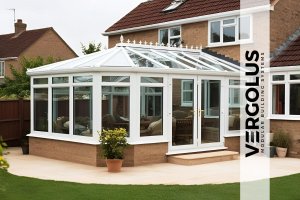Conservatory Extension: Styles, Materials & What to Consider
A conservatory extension is one of the most popular and cost-effective ways to add light, space, and value to your home. Whether you’re dreaming of a sunlit dining area, a tranquil reading nook, or an open-plan kitchen-lounge, a well-designed conservatory offers versatility with timeless appeal.
In this article, I will break down the different styles, materials, and practical considerations to help you plan the perfect conservatory extension for your property.
Content:
- What qualifies as a conservatory extension
- Types: Victorian, Edwardian, lean-to, etc.
- Energy efficiency & insulation
- All year round use: glazing and heating tips
- Planning permission & building regulations
What Qualifies as a Conservatory Extension?
A conservatory extension is a structure added to the rear or side of a property, typically featuring a glass roof and large glazed walls. To be considered a true conservatory under UK building regulations, it generally must:
-
Be built at ground level
-
Be separated from the main house by external doors (unless building regulations are followed)
-
Have a roof that is at least 75% glass
-
Have walls that are at least 50% glass

Modern conservatories can blur the line with full extensions, particularly when designed for all year round use with high-spec glazing and thermal insulation.
Popular Conservatory Styles
Victorian Conservatory
-
Curved bay front
-
Ornate roof with a steep pitch
-
Decorative ridge details
Best for: Traditional homes seeking period charm
Edwardian Conservatory
-
Square or rectangular floorplan
-
Flat-fronted design for maximum space
-
Pitched roof with classic symmetry
Best for: Practical layouts with a timeless look
Lean-To Conservatory
-
Simple roof that slopes away from the house
-
Straight lines and minimal detailing
Best for: Modern homes or properties with limited space
Gable-End Conservatory
-
Upright front gable for dramatic height
-
Cathedral-style ceiling
Best for: Grand, light-filled spaces
P-Shaped or L-Shaped Conservatory
-
Combines styles to wrap around the property
Best for: Larger homes or multifunctional living areas
Choosing the Right Materials
uPVC
-
Cost-effective, low-maintenance
-
Available in various colours and finishes
-
Excellent insulation
Ideal for: Budget-conscious homeowners
Aluminium
-
Slim frames for a modern, minimalist look
-
Durable and weather-resistant
-
Recyclable and sustainable
Ideal for: Contemporary glass extensions
Timber
-
Warm, natural aesthetic
-
Excellent insulator when properly treated
-
Requires regular maintenance
Ideal for: Heritage homes or character properties
Many homeowners worry about conservatories being too hot in summer and too cold in winter. But modern design solves this.
Key considerations:
-
Solar control glazing reduces overheating
-
Low-e glass improves insulation
-
Roof vents or skylights for passive cooling
-
Underfloor heating or electric radiators for winter
-
Thermal breaks in frames prevent condensation and heat loss
With the right materials, a conservatory can be a fully usable living space all year round.
Planning Permission & Building Regulations
You may not need planning permission if your conservatory falls under permitted development. However, keep these in mind:
-
It mustn’t exceed 3–4 metres in depth (depending on your home type)
-
It should be lower than the highest part of the roof
-
No more than half the land around your house should be covered by extensions
If your conservatory will remove thermal separation (e.g. no doors between it and the house) or include heating, building regulations approval is likely required.
Vergolus offers full design-and-build services with planning and regulations handled for you.

Frequently Asked Questions: Conservatory Extension
1. Do conservatories add value to your home?
Yes. A well-built conservatory can add up to 5–10% to your property’s value and significantly boost buyer appeal, especially when designed for year-round use.
2. How much does a conservatory extension cost?
Costs vary depending on size, materials, and features. Expect to pay from £15,000 to £35,000+, with bespoke designs or solid roof options potentially costing more.
3. Can I install a solid roof on a conservatory?
Yes. Many homeowners upgrade to a tiled or hybrid roof to improve insulation and comfort. Keep in mind: this may affect planning permission and building regulations.
4. Is a conservatory cheaper than a full extension?
Typically, yes. Conservatories involve fewer structural changes and require less labour, though high-end conservatories may approach the cost of a traditional extension.
5. Do I need planning permission for a conservatory extension?
In most cases, conservatories fall under permitted development rights, but this depends on the size, location, and design. Always check local planning rules or consult a specialist.
6. Can I use a conservatory all year round?
Absolutely. With modern glazing, insulation, and efficient heating, a conservatory can be comfortable in all seasons, not just summer.
7. Which conservatory style is best for my home?
It depends on your property type and layout. Victorian and Edwardian styles suit period homes; lean-to or gable-end conservatories work well for contemporary designs and smaller spaces.
8. What materials are best for a conservatory frame?
-
uPVC is affordable and low-maintenance.
-
Aluminium offers slim sightlines and modern appeal.
-
Timber brings character but requires upkeep.
9. What type of glazing is best for energy efficiency?
Use Low-E double or triple glazing combined with thermal breaks in the frames. Solar control glass and self-cleaning options also enhance performance and comfort.
10. How long does it take to build a conservatory?
Most conservatories are completed in 3–6 weeks, depending on size, complexity, and whether groundwork or planning approval is needed.
Ready to Plan Your Perfect Conservatory Extension?
Whether you’re drawn to sleek, modern conservatories or classic Victorian designs, Vergolus can bring your vision to life—on time, on budget, and built for comfort all year round.
Request your free consultation today. Let’s transform your space with natural light and elegant design.
Contact us | Expert design & build for bespoke glass extensions.


